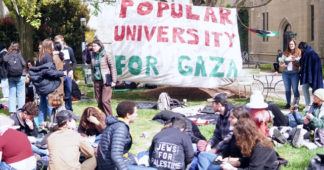On the night of May 8, the student leaders emerged victorious from a campaign that disrupted the university campus and blocked access to the Book of Kells.
May 9, 2024
The pro-Palestine student protests at Trinity College Dublin have led the university to pledge to cut ties with Israeli companies, ending the five-day encampment set by students.
On the night of May 8, the student leaders emerged victorious of a campaign that disrupted the university campus and blocked access to the Book of Kells.
In its statement, the university said that senior management made a deal with the students, adding that “Trinity will complete a divestment from investments in Israeli companies that have activities in the Occupied Palestinian Territory and appear on the UN blacklist.”
“Trinity will endeavor to divest from investments in other Israeli companies,” it announced.
The university added that its list has one Israeli company that will have to stay until March 2025 based on the contract.
According to the statement, the university understands the logic behind the encampment and acknowledges the magnitude of the horrors taking place in Gaza. It condemned all violence of war and the “continuing ferocious and disproportionate onslaught in Gaza,” highlighting that “The humanitarian crisis in Gaza and the dehumanization of its people is obscene.”
The university also announced that it will grant places to six postgraduate and two undergraduate students from Gaza, adding that “All fees have been waived for these scholars and Trinity will use its Sanctuary Fund to provide accommodation.”
They also launched a new task force with student and staff representatives to review the university’s student exchange with “Israel”.
The encampment started on May 3 as students set up dozens of tents in Fellows’ Square in support of Gaza, which did not witness violence from police, and the senior dean Eoin O’Sullivan thanked the students for their “engagement”.
The power of the protests
As the Dublin campus was shut down to the public, it cost the university around €350,000 (£300,000) in forfeited revenue, as no visitors could access the Book of Kells, which is a medieval manuscript and a tourist attraction.
The features editor of Trinity News (a student paper) Ruby Topalian said, “I think the loss of revenue was key.”
She added that students welcomed an agreement that was achieved on more favorable terms than others at different universities emphasizing, “I think it’s unprecedented. The campus seems very happy.”
In addition, the outgoing students’ union President Laszlo Molnarfi said that the group Trinity Boycott, Divestment and Sanctions had emerged victorious, “It shows the power of grassroots student and staff fighting for a just cause of Palestinian liberation and to end complicity with Israeli genocide, apartheid, and settler colonialism.”
EU employees protest in Brussels against Israeli war on Gaza
In a display of solidarity and condemnation, over 100 employees of European Union institutions gathered in Brussels on May 8 to voice their opposition to the ongoing Israeli aggression against the Gaza Strip.
Organized in front of the European Commission’s main office in Brussels, demonstrators draped three white cloth covers, symbolically marked with red stains, bearing the inscriptions “international law”, “European Union conventions,” and “Convention on the Prevention and Punishment of the Crime of Genocide.”
Manus Carlisle, a European Commission employee, emphasized the peaceful nature of the gathering, stating, “We are here to defend the fundamental principles and values upon which European institutions are founded – the principles of human rights, human dignity, and freedom.”
The European Commission opted not to provide any comment regarding the protest.
We remind our readers that publication of articles on our site does not mean that we agree with what is written. Our policy is to publish anything which we consider of interest, so as to assist our readers in forming their opinions. Sometimes we even publish articles with which we totally disagree, since we believe it is important for our readers to be informed on as wide a spectrum of views as possible.











